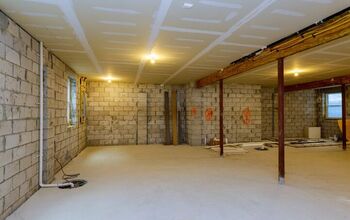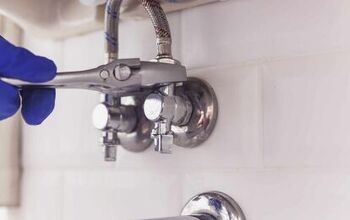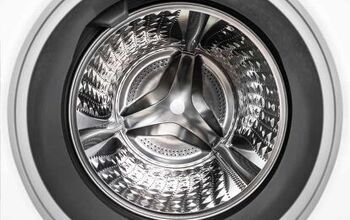Basement Smells Like A Sewer? (Possible Causes & Fixes)

Having been in my fair share of gutted-out warehouses, I’m well aware that basements naturally seem to trap certain odors. One of the most alarming issues that you may come across in a basement is a stinky odor that resembles a sewer. Unless you are a Teenage Mutant Ninja Turtle, you don’t want to have a basement that smells like a sewer. Ever wonder what gives?
If your basement smells like sewage, it is likely due to dried-out plumbing pipes. Other causes include a burst pipe, a leaky toilet ring in a basement bathroom, a missing cleanout plug, and clogged vents.
A stinky sewer-y basement is not something you should ignore. Let’s talk about why this is happening and what you can do to fix this issue in brief.
Do You Need Sewer Cleaning Services?
Get free, zero-commitment quotes from pro contractors near you.

Why Does My Basement Smell Like A Sewer?
Basements usually emit a sewage smell as a result of sewer gas leaking into the area. This can lead to health problems if you let it go for too long. Let’s talk about what causes this.
Dried Out Plumbing Pipes
Whether it’s a water trap on the floor made for your laundry room or a P-trap from that sink you never use, disuse can cause plumbing lines to dry out. After all, water will evaporate if it’s left standing for too long. When there’s no water in your basement’s water traps, your plumbing will have a direct line to the sewer. This will make sewer gas leak out.
Running your sink/toilet/everything fixes this. You don’t need to make a major ordeal about this. A single flush is enough to replenish your toilet’s traps. If you have a sink with dried-out traps, then just run the water for one to two minutes. That will be enough to fill up your P-traps. Give your basement a couple of hours for the odor to dissipate, too!
On a similar note, if you have floor drains that aren’t used frequently, they could have dried out and given way to the sewer line. This means that you are going to have to replenish the water in the P-trap too. Pour a gallon of water in the floor grate, and you’re good to go.
Burst Pipes
This is hopefully not the reason why you have a sewer smell problem, because it’s the one thing that requires professional attention. If you notice a drop in water pressure in your home or feel that the smell is coming from behind a wall, a burst pipe is probably the problem. This is doubly true if you notice staining occurring near your walls or in a line on your floor.
Most of the time, a burst pipe will be the reason for sewer smells that just don’t seem to go away. If you have tried to check every other item on this list, you may be better off revisiting this. It’s usually the “hidden reason” for sewer smells.
A Leaky Toilet Ring
Do you have a toilet in your basement? If so, then you have a toilet ring that holds it in place and keeps the contraption airtight. As the years pass, that toilet ring might end up losing its ability to stay in place. When that happens, the airlock that kept sewer gasses from creeping into your bathroom is lost. This leads gas to enter your bathroom, which in turn, makes your basement smell like sewage.
If you have this issue, the only way to get this fixed is to replace the toilet ring. You can do this on your own, or hire a plumber to do it. Either way, you should get this fixed because it also can lead to health issues.
A Missing Cleanout Plug
Do you have a small floor grate that drains out the water from your laundry room or bathroom? Open the grate up and check the cleanout plug. This is a small physical plug that helps separate the water from the sewage line. If there is no plug, then it may have been removed but not replaced.
Replacing this plug is the best way to get rid of a sewage smell in your basement, if it’s missing.
Ejector Pit & Pump Problems
It’s important to note that many basements don’t have an ejector pit that can cause sewer gas leaks. This is a feature that happens with basements that have an overhead sewer line. If you have an overhead line, you are going to have to have an ejector pit that is well-sealed and properly vented to carry out the sewer gas correctly.
There are several things you need to make sure of here. We’re going to lead you through the basics:
- Start by looking for a lid. No lid? Well, there’s your problem. Ejector pits need lids.
- Check to see that your pit is actually sealed. A loose or broken seal needs to be replaced and tightened up. If there is no plug or seal, then you need to call your plumber immediately.
- Then, look at the vents. If you notice that the vents seem to be cloggy or aren’t really taking in air, you need to unclog them. This can be done through a call to your plumber or sewage line treatment company near you.
- Check out the waste and vent pipes for any cracks or issues. If there are cracks, then you may need to replace or patch the offending part.
Clogged Vents
Another issue that can cause sewer leaks comes from poor ventilation in basements, especially when it comes to vents associated with your sewage line. The gas that gets produced from sewage (or even grey water, really) needs to be vented out in order for your sewage system to run smoothly. Whether it’s due to too much toilet use or just random buildup, it’s possible to have vents clog up.
When your vents are clogged up, the sewer gas that gets generated from all that gunk has nowhere to go. This leads to a buildup that will eventually start seeping into your basement. Having a plumber who specializes in sewer line ventilation can help you unclog those vents. (Trust me, you don’t want to try this on your own, especially if you have a sensitive nose!)
When Should You Call A Professional?
Honestly, most people’s go-to choice is to call a professional when they notice a sewage smell in their basement. This is often because they just don’t want to deal with whatever could be causing that stink. And, really, who can blame them? It’s a nasty smell! With that said, there are several moments where calling the pros makes sense:
- You are having a hard time finding the source of the odor. This could be an issue that you might not be able to deal with on your own, like a burst sewer line.
- The work it requires is way more advanced than what you’re willing to do, or requires tools you don’t have. This is often the issue when you’re dealing with clogged ventilation systems. After all, those vents can clog up on ANY floor of the home and cause a sewer basement smell.
- You are feeling overwhelmed with the repairs. Sometimes, we just get squicked out with the fact that sewer gas is there. If you’re like me and have a very strong sense of smell, foul odors can make you gag and retch. Trying to solve this type of problem on your own is not going to be easy on you, so you might as well ask someone else to do it.
Do You Need Sewer Cleaning Services?
Get free, zero-commitment quotes from pro contractors near you.

Related Questions
Is a sewer smell in the basement dangerous?
Believe it or not, a sewage smell in your basement can be dangerous. Sewer gas can contain dangerous bacteria that you can inhale, not to mention gasses that are not the best for your health. If you notice that swampy smell in your home, it’s in your best interest to address it immediately.
Is sewer gas flammable?
Yes, it can be. Sewer gas contains both methane and hydrogen sulfide. In small quantities, this won’t be too much of an issue. In larger quantities, it can be extremely flammable. Lighting a match near sewer gas can cause explosions, massive fires, and injuries to people around the area. Do not try to light a scented candle to get rid of the gas, as this can actually be a lethal mistake.This is a major fire risk. The best way to reduce the fire risk is to address the sewer gas leak as soon as you get a whiff of it.
Can sewer gas suddenly go away?
Yes, but it’s more likely that your nose got overwhelmed by it and stopped being able to smell it. Unless your basement got cleared of sewer gas and has officially been remediated, then you should assume that the gas is still there. Otherwise, you may have a serious problem on your hands that could affect your home’s safety.

Ossiana Tepfenhart is an expert writer, focusing on interior design and general home tips. Writing is her life, and it's what she does best. Her interests include art and real estate investments.
More by Ossiana Tepfenhart




















![12 Washing Machine Brands to Avoid [with Recall Data]](https://cdn-fastly.upgradedhome.com/media/2023/07/31/9075781/12-washing-machine-brands-to-avoid-with-recall-data.jpg?size=350x220)






